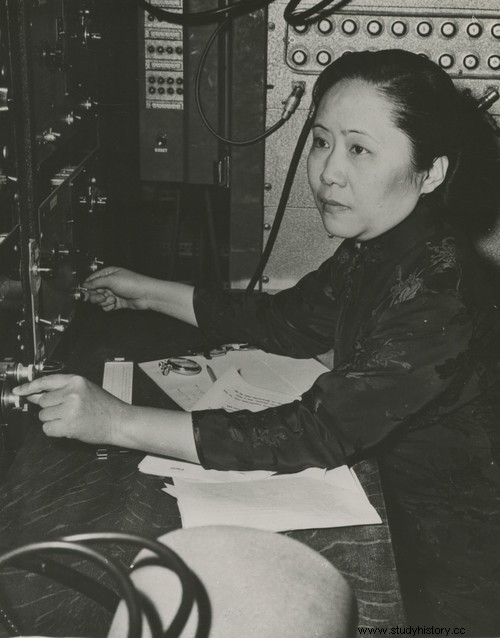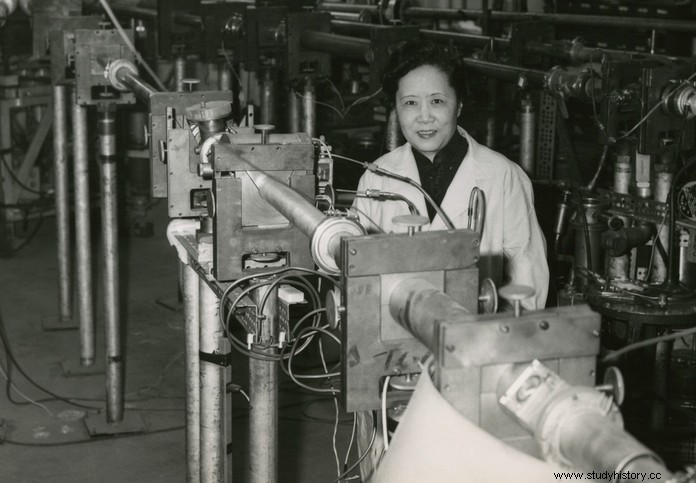Chien-Shiung Wu (1912 – 1997) was a Chinese-American physicist, specialist in nuclear physics. Within the scientific community, she has been nicknamed "First Lady of Physics".
"Brave heroes"
 Daughter of Fan Fuhua and Wu Zhongyi, Chien-Shiung Wu was born on May 13, 1912 in Shanghai but It was in Liuhe, about fifty kilometers away, that she grew up with her two brothers. Her parents are open and progressive, and in particular her father, an early advocate for gender equality. Founder and teacher at the Mingde Higher Vocational School for Women, he encourages his daughter to study, which is unusual. His first name, meaning "valiant hero", testifies to his parents' confidence in his skills.
Daughter of Fan Fuhua and Wu Zhongyi, Chien-Shiung Wu was born on May 13, 1912 in Shanghai but It was in Liuhe, about fifty kilometers away, that she grew up with her two brothers. Her parents are open and progressive, and in particular her father, an early advocate for gender equality. Founder and teacher at the Mingde Higher Vocational School for Women, he encourages his daughter to study, which is unusual. His first name, meaning "valiant hero", testifies to his parents' confidence in his skills.
Chien-Shiung therefore attended school in her city and then, at the age of eleven, joined the normal school for young girls in Suzhou, about a hundred kilometers from Shanghai. She trained there for a career as a teacher but ended up discovering her passion for science. Fearing that her studies had not prepared her enough for university, she considered giving it up, but her father encouraged her to pursue her goal. He provides her with textbooks and urges her to prepare for the entrance exams on her own.
Chien-Shiung follows his advice; in 1929, she joined the National Central University in Nanjing. In 1934, she obtained her degree in physics. In 1936, Chien-Shiung left to continue his studies in the United States, at the University of California at Berkeley. She studied there under the direction of physicist Ernest Lawrence, winner of the Nobel Prize in Physics in 1939. In 1940, after obtaining her doctorate, she began teaching.
The Manhattan Project
In 1942, Chien-Shiung Wu married physicist Luke Chia-Liu Yuan, with whom she had a son and with whom she settled on the east coast. The young physicist taught for a while at Smith College and Princeton University – where she became the first woman to obtain the title of assistant professor – before settling at Columbia University. His life is now well established in the United States. World War II broke out several years ago, as did the Sino-Japanese War. The United States has entered the war and Chien-Shiung sees no other way to support his family and his country than to devote himself to research to try to help victory. In 1942, she was one of the few women to have joined the Manhattan Project, the research project that produced the atomic bomb. In particular, she developed a process for separating uranium isotopes by gaseous diffusion.

An international specialist
After the war, Chien-Shiung Wu concentrated her research on a branch of nuclear physics, beta decay, of which she became an international specialist. She worked alongside physicists Tsung-Dao Lee and Chen Ning Yang on parity laws and, in 1956, validated their theory by demonstrating experimentally the non-conservation of parity in weak interactions. This demonstration refutes a theory of physics considered a law of nature (claiming that during nuclear reactions, the mode of dispersion of particles follows no particular direction) and consequently shakes the world of physics. The following year, Lee and Yang received the Nobel Prize for their work; Chien-Shiung is not mentioned. While some argue that the experimental nature of her work is less important than the theories of her colleagues, it is more likely that she was, like many others, a victim of sexism.
Widely recognized by her peers, Chien-Shiung nevertheless receives numerous awards and accolades. Among these prizes, in 1958, she was elected a member of the National Academy of Sciences of the United States and received the prize of the Research Corporation (English); in 1960, she obtained the Achievement Award American Association of University Women . In 1965, Chien-Shiung published a book on beta decay (Beta decay ) which remains a reference for nuclear physicists today. In 1975, she became the first woman to serve as president of the American Physical Society. In 1978, she won the very first Wolf Prize in Physics, awarded by the Wolf Foundation in Israel and considered one of the most prestigious distinctions in the field.
Chien-Shiung Wu died on February 16, 1997 in New York at the age of 84.
